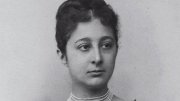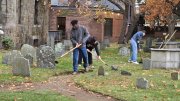When David Illingworth ’71 and Allan Ryan went to college, the causes of the day were civil rights and opposition to the Vietnam War. Now, campus progressive groups are rallying to oppose sweatshop labor and support a “living wage” for University employees. And the students who came of age in the 1960s find themselves on the inside of University Hall, as Illingworth, Ryan, and a handful of other officials try to handle the increasingly vocal protests of a new generation of Harvard activists.
“When we heard students rallying and protesting and carrying signs and demanding action, it was something we could immediately relate to,” says Ryan, a University attorney who oversees sweatshop issues for Harvard. “Does that mean that we are here to say yes to whatever the students ask for? No, it doesn’t. We have grown up and become college administrators. But I think there is a sense that they have a legitimate basis to come to us.”
Members of the Progressive Student Labor Movement (PSLM) are demanding that Harvard pay a “living wage” of $10.25 an hour to all its lowest-paid employees and that the University join the as-yet unformed Workers’ Rights Consortium, a labor monitoring group that would inspect the conditions in factories producing Harvard-logo apparel and similar wares licensed by other schools. The University is already a member of the Fair Labor Association, a rival monitoring group, but PSLM members claim that its standards are inadequate and that the group is too beholden to businesses (six of 13 slots on its governing board are given to member corporations). Furthermore, even though a University committee recommended in May that Harvard extend job training and health-insurance benefits to almost all University employees, including casual workers and those employed through subcontractors (see adjacent story), PSLM members say these concessions are no substitute for higher wages.
The group has staged increasingly aggressive protests this semester, holding teach-ins in administrative buildings, occupying the College admissions office to hand out leaflets to prospective freshmen during “pre-frosh weekend,” and bringing actors Matt Damon ’92 and Ben Affleck to Harvard to headline a protest during the busy ArtsFirst weekend in early May.
In response, the new generation of Harvard administrators has thus far eschewed the tactics the University used in 1969, when police officers forcibly ousted protesters from University Hall. Even when PSLM members disobeyed University police department requests to leave the admissions office in April, the police (after consulting with administrators) declined to arrest them, and the College took no disciplinary action against them.
University officials say their relationship to the protesters is focused around productive conversation driven by reasoned argument, not noisy protest or PSLM’s numbers. (Though hundreds of students turned out to hear Damon endorse the living-wage campaign, celebrity-less protests generally attract fewer than 50 students.) “They have our ear,” Ryan says. “It’s one thing to have a mass rally out there, but if you really want to get anything done, it may be more effective to sit down with me and whoever else is involved in these issues and say, ‘Here’s what we want to change.’ When students go into administration buildings and walk up and down the corridors making noise,” he adds, “I think they set themselves back. Nothing is really accomplished and the University’s attention necessarily has to turn to what we should be doing to make sure disruptions like that don’t happen again or cause us to lose time and effort on the job.”
Administrators even say they identify with the protesters. Ryan traces a historical chain from the civil-rights activism he says he was involved in during his time at Dartmouth to antiwar and antiapart-heid movements and ultimately PSLM’s labor activism. Illingworth—now associate dean of the College and the College’s primary liaison to student groups, including PSLM—says he too learned from his participation in antiwar protests as a Harvard undergraduate. “Back then, we felt as if we were not being heard,” he explains, “and I vowed not to ignore the student voice once I was part of the older generation.”
PSLM members say that living through the late 1960s may have turned College administrators away from the most extreme responses to protests, but hasn’t led them to feel a greater commitment to progressive causes.
“You can count the number of times they bring up the ’60s. It’s just absurd,” says Ben McKean ’02, a PSLM member. “I hope they’ve learned a lesson—that bringing in the cops to bust heads isn’t the best way to break up a protest. But from our perspective, what it does is give them another rhetorical ploy.”
Indeed, PSLM member Amy Offner ’01, whose parents were both involved in the 1969 University Hall takeover, says the more things have changed for activists at Harvard, the more they have stayed the same—University officials remain recalcitrant in dealing with students’ demands. “I’m completely unconvinced of their good will and good faith in trying to promote dialogue with us,” Offner says. “Their actions have been hostile. Their claim that we have this productive working relationship is basically an attempt to gloss over and distract from the fact that they are ignoring and resisting our demands…What makes Harvard change is public humiliation and threats of embarrassment. When Harvard’s good name gets sullied in the press, that’s when Harvard gets scared.”
Offner says PSLM may continue to escalate its protests, not ruling out the building takeovers and sit-ins that similar groups at other schools have used. “It’s going to be quite a struggle,” she adds, “and we think it’s only going to escalate from here.”
~Rachel Kovner





